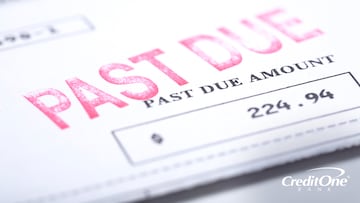Dealing with Missing a Credit Card Payment
May 21, 2024
Topics:
Credit CardMissing a credit card payment could damage your credit. Find out the steps you can take to help minimize the effects of a missed credit card payment.

Introduction
Feeling like you can’t pay your bills is stressful, and realizing you missed a payment can be heart-stopping. The repercussions and aftereffects can be lasting. But knowing how to deal with the situation, and following a proven plan, can get you through it.
What Happens When You Miss a Credit Card Payment?
Missing a credit card payment, whether it’s because of your economic circumstances or simply because you forgot to make it, can set up a snowball effect. First, you might be subject to fees and penalties. Next, you’ll likely accumulate interest charges. And finally, it could adversely affect your credit score. In fact, a single missed payment can lower your credit score by 100 points.
What To Do if You Miss a Credit Card Payment
Luckily, a missed payment isn’t the end of the world, and you can take some steps to help minimize any damage caused by being past due.
Step 1: Stay calm
Being stressed out because you’re struggling to pay your credit card is natural — but it’s probably not going to help things. Try to stay calm, take a deep breath, and accept your situation. Then you can start doing something about it. And you’ll be much more effective if you’re calm, cool, and collected.
Step 2: Do the math
If you can’t make your credit card payment, things aren’t adding up financially. It’s usually due to either spending too much or not earning enough. And you’ll probably have to make some adjustments either way.
It can be difficult to formulate a plan without making a budget, so write down exactly what you’re earning and what you’re spending — including which expenses are wants, and which are needs. Then figure out what you can cut back on — or how you might bring in more income — so you can get current on your credit card account.
Step 3: Think about what you’re going to say
What you tell your credit card issuer and how you say it can both play a role in convincing them to work with you. So take a few moments to rehearse what you’re going to say without getting angry or upset.
Jot down the topics you want to discuss, which may include:
- What happened: Describe your circumstances, including why you’re unable to make your payment. If you lost your job or are going through a divorce, share that. Keep it brief and don’t overwhelm the representative with details, but paint a clear picture of what’s preventing you from making your payments.
- How you can fix it: Reveal your plans for overcoming your situation, such as looking for employment, selling items to raise money, or borrowing from family members. Creditors may be more willing to work with you if they know you’re in the process of turning things around.
- What you can pay: Offer to make a payment you can afford, even if it’s less than the minimum due. This makes it clear that you haven’t turned your back on your debt. And, from the credit card company’s perspective, it’s usually better to get some money than nothing.
- How long it will take: Explain how long you expect your situation to last, and when you might be able to resume making regular payments of at least the minimum amount due. Be realistic and don’t paint an overly optimistic picture, but don’t underwhelm them, either.
- What should happen next: What are you hoping to achieve with your phone call? Are you looking for one suspended payment, a temporary payment schedule, or the removal of late fees? This call is a negotiation, so be specific about what you’re hoping to accomplish. You may not get what you want, but your chances are better if you clearly articulate it.
Step 4: Contact your credit card company
Once you’ve mapped out your intentions, it’s time to make the call. If you’re already behind on your payments, explain your situation. And if you know you’re about to miss a payment, be proactive and call before the payment due date comes and goes.
Credit card companies are in the business of making money, and that doesn’t happen if they ignore debts owed by cardholders. By reaching out, you’re demonstrating good faith and a willingness to work with them, which could buy you time or persuade them not to report your account as past due.
Of course, your results depend on your situation, the creditor’s policies, and even the representative’s mood. But ultimately, a credit card company doesn’t want to charge off your account and sell it to a collections agency. They would usually rather help you get current so you can remain a paying cardmember.
Step 5: Put your plan into action
A plan is only as successful as its execution. So, if you made arrangements with your credit card company, keep them. Pay what you promised, when you promised, how you promised. Their willingness to continue working with you — and offering some form of relief — will most likely depend on you living up to your end of the agreement.
Step 6: Prepare for consequences
Unless your credit card company agrees to waive late fees or interest, you’re likely going to be charged both. If you have a rewards credit card, you may lose any accumulated rewards. And if your credit card issuer is reporting the past due status of your account, your credit score will probably take a hit.
These are simply the realities of missing payments. If your card issuer is willing to waive interest and fees, let you keep any accumulated rewards, or refrain from reporting your account as past due, consider yourself very lucky. But consequences are quite probable, and being prepared could help them sting a bit less.
Step 7: Formulate a plan for any aftermath
Unless your credit card issuer has agreed not to report your delinquency to the major credit bureaus, any payment over 30 days past due will likely be reported. This will adversely affect your credit score, and a single delinquency can stay in your credit reports for up to seven years.
But with a little diligence, you can help your credit rebound. Going forward, make at least the minimum payment on that account (and all other accounts) on time, every time, because payment history is the most important factor in determining your credit score. Keeping your credit utilization ratio at a healthy level — experts recommend 30% or less — could also help improve your credit score.
How To Prevent Late Payments
You can use a few tricks to prevent late payments in the future.
- Create a budget: Every expert says it, and many people avoid it, but it’s important to figure out what you have coming in and going out. Then you can decide which expenses are crucial and which ones you can cut out.
- Set up AutoPay: We’re all dealing with multiple bills, due at different times of the month, so it’s hard to tackle the whole thing manually. Consider setting up automatic payments (or AutoPay) to take these tasks off your plate. You often have a choice whether just the minimum payment or the full balance gets withdrawn from your bank or debit card on a specified date.
- Use reminders: If you’d rather control when and how much gets pulled from your bank account, create due-date reminders in your calendar — preferably a digital program on your phone or computer, but a paper calendar or planner can work as well.
- Prioritize payments: If you can’t pay every single bill one month, pay the most important first. Your mortgage or rent, car payments, loans and credit cards will have the biggest impact if you miss a payment, whether by affecting your credit score or causing repossession or eviction. Utility bills are important to avoid having your essential services cut off, but sometimes you can get payment help when you need it. Subscriptions and entertainment are probably dispensable.
Bottom Line
Nobody likes being behind in anything. But remember, falling behind doesn’t have to mean staying behind. Formulating and executing a plan lets you minimize, and eventually overcome, the effects of a missed credit card payment.
If you’d like a credit card that offers AutoPay options and lets you set your own due date, see if you pre-qualify for one from Credit One Bank.



